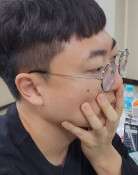Overeducation Trap?
Overeducation in Korean society is reaching a dangerous level. As of the end of last year, nine out of 10 employees with masters degrees fall under the status of overeducation, having lower-level jobs compared to their educational background. Surveys show that about half, or 49.5 percent, of four-year university graduates are in charge of work that can be sufficiently covered by those with a high school diploma. The same is true with Ph.D.s; nearly half (44.8 percent) of whom are reportedly getting lower-level jobs. Such facts are identified in the Analysis Report on the Actual Conditions of Overeducation Caused by Educational Inflation, which was released by the Ministry of Labors Korea Labor Institute (KLI) and recently obtained by the Dong-A Ilbo.
The report is based on the Educational Requirements by Occupation and the Employment Structure Survey by Industry and Occupation produced by the Central Employment Information Office (CEIO) using the National Statistics Office (NSO) data in 2002 and 2004.
Kim Young-min (34), who received a Ph.D. in law at a prominent private university in Seoul, quit his job as an instructor when several private institutes he was working for went bankrupt right in a row. He worked for a home-delivery service near Namdaemun-ro and Mugyo-dong in Jung-gu, Seoul. After suffering a few motorcycle accidents, he is currently working as a repairman at a bicycle repair shop in Jamwon-dong, Seocho-gu. His earnings are nothing but some 450,000 won a month, which often is not given as scheduled. He applied for a messenger post at elementary school several times, but was rejected every single time for being overeducated for the job.
Lee (29), who graduated from a four-year university in Busan, passed the Incheon Regional Maritime Affairs & Fisheries Office (IRMAFO)s special recruitment test last year and is working as a lighthouse keeper in Palmi Island, Incheon.
Such realities of overeducation and downward employment are also shown in the number of students entering vocational training schools this year. Vocational training schools are one-year skills-building training courses designed to help job seekers with less than a high school diploma.
This year, among 6,461 new students in 21 vocational training schools nationwide, 876 were four-year college graduates and 1,334 two-year junior college graduates. Highly-educated students with more than junior college degrees account for 31 percent of the total number of students.
That percentage is on the sharp rise each year, reaching five percent in 2000, eight percent in 2002, 13 percent in 2003 and 18 percent in 2004.
One 29-year-old, a new student of the Chungju Vocational Training School this year who is identified only by his initial, L, graduated from the electronic engineering department of a prominent national university in the non-metropolitan area three years ago. It was of no help in job seeking that I graduated from a four-year university. It seems to me that I only wasted time and money, he said.
Last year, 82.1 percent of Korean high school graduated entered universities and junior colleges, which is among the worlds highest levels.
The number of this years February graduates with more than junior college degrees amounted to some 490,000 (220,000 from two-year junior colleges and 270,000 from four-year universities), up by a whopping 53 percent, or 170,000, from 320,000 10 years ago.
Meanwhile, so-called decent jobs for college graduates are on the decline. In 1997, right before the Asian financial crisis, the number of new employees in the top 30 large businesses, state-owned enterprises and financial institutes were 1.58 million. That figure has progressively shrunk down to 1.30 million last year, down by a staggering 280,000 employees.
Excess education inevitably leads to wasted national strengths and inefficiencies in society as a whole.
Last years KLI estimate shows that costs for graduation from two-year and four-year colleges were somewhere between 67 and 120 million won. Accordingly, social costs calculated on the basis of unemployed college graduates alone reach over 20 trillion won.
Small and mid-sized enterprises and college graduates are having a hard time recruiting employees and finding jobs, respectively, as students blindly choose to enter college without considering industry demands at all, said Park Cheon-soo, CEIOs trend analysis team manager. Koreas human resources management system is stuck in the trap of overeducation.
Kwang-Hyun Kim Keuk-In Bae kkh@donga.com bae2150@donga.com





![아침 공복 따뜻한 물 한 잔, 정말 살 빠지고 해독될까?[건강팩트체크]](https://dimg.donga.com/c/138/175/90/1/wps/NEWS/IMAGE/2026/03/05/133467930.3.jpg)

